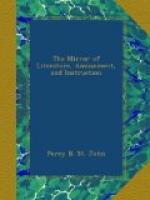On the morning of Jan. 20th, 1648, towards noon, the High Court, having first held its secret sitting in the Painted Chamber, prepared to enter upon the final details of its mission. Prayers were scarcely over, before it was announced that the king, borne in a close sedan between two rows of soldiers, was on the point of making his appearance. Cromwell ran to the windows, and as suddenly hastened back, pale yet highly excited—“He is here, he is here, sirs; the hour for this grand affair draws nigh. Decide promptly, I beseech you, what you intend to reply; for he will instantly inquire in whose name and by what authority you presume to try him.” No one making any reply, Henry Martin at length observed—“In the name of the Commons assembled in Parliament, and of all the good people of England.” To this no objection was made. The court proceeded in solemn procession towards Westminster Hall, the President Bradshaw at its head; before him were borne the mace and sword; and sixteen officers armed with partisans, preceded the court. The President took his place in an arm-chair adorned with crimson velvet; at his feet sat the clerk, near a table covered with a rich Turkey carpet, and upon which were placed the mace and sword. On the right and left appeared the members of the court upon seats of scarlet cloth; while at the two ends of the hall stood the guards, all armed, a little in advance of the tribunal. The court being installed, all the doors were thrown open; the crowd rushed into the hall. Silence being restored, the act of the Commons appointing the court was read, the names were called over, and sixty-nine members were found to be present. “Sergeant,” said Bradshaw, “let the prisoner be brought forward!”
The king appeared under guard of Colonel Hacker and thirty-two officers. An arm-chair, adorned with crimson velvet, was in readiness for him at the bar. He came forward; fixed a long and severe look upon the court, and seated himself without taking off his hat. Suddenly he rose, looked round at the guard upon the left, and at the spectators upon the right of the hall; again fixed his eyes upon his judges, and then sat down, amidst the general silence of the court.
Bradshaw rose instantly:—“Charles Stuart, King of England, the English Commons assembled in Parliament, deeply penetrated with a sense of the evils that have fallen upon this nation, and of which you are considered the chief author, are resolved to inquire into this sanguinary crime. With this view they have instituted this High Court of Justice, before which you are summoned this day. You will now hear the charges to be preferred against you.”
The Attorney General Coke now rose. “Silence!” exclaimed the king, at the same time touching him on the shoulder with his cane. Coke, surprised and irritated, turned round; the handle of the king’s cane fell off, and for a few moments he appeared deeply affected. None of his attendants were at hand to take it up; he stooped and picked it up himself, and then resumed his seat. Coke proceeded to read the act imputing to the king all the evils arising first out of his tyranny, subsequently from the war; and requiring that he should be bound to reply to the charges, and that judgment should be pronounced against him as a tyrant, a traitor, and a murderer.




